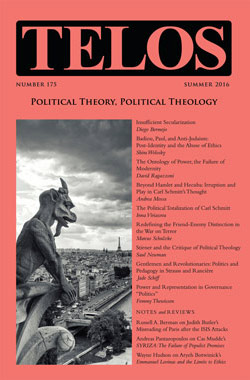By Devin Lefebvre · Thursday, June 8, 2017 For many today, Claude Lefort is a thinker known mainly by association, someone whose work emerges where others are asked to situate their projects relative to his thinking of the political. He is a prominent, if not central, figure for the more post-structuralist thinkers of radical democracy. Lefort’s sense of democracy—as that form of society where the place of power is empty—is vital to those projects that would likewise tie democracy to the symbolic character of power, and to the distinct workings of politics and the political. Interestingly, while debate over the correct translation of le or la politique seems to almost always return to Lefort, it remains the case that for his own part Lefort was never much interested in post-structuralism. For him, the post-structural turn, itself bound up with the legacies of May 1968 and the new knowledge, obfuscated almost as much as it made clear.
Continue reading →
By Russell A. Berman · Monday, June 13, 2016  Critical theory inherited the mission of philosophy to know the world and to pursue the good life. Careful examination should shed light on the cosmos and our place within it and contribute to a beneficial ordering of human concerns, when wisdom informs governance. Yet that aspiration to know the world encountered the limits of intelligibility, beyond which reason could not proceed. Meanwhile, the efforts to remake the world in the spirit of reason elicited processes of rationalization, as deleterious to the world around us, the natural environment, as to the world within us, the ongoing cultural crisis of modernity and its social corollaries. That is Horkheimer and Adorno’s dialectic of enlightenment at the foundation of the critical theoretical tradition that continues to provide a framework with which to articulate a critique of the contemporary in its many heterogeneous facets: the disruption of all forms of solidarity, the pressures on family structures, the erosion of educational opportunities, the growing gap between rich and poor. Add to this the ominous shifts in the international order, including the breakdown of state structures from North Africa through the Middle East, the strains on the European Union, and the return of a repressive semi-dictatorship in Russia, while—at this point in the presidential election season—the United States seems to be tumbling dangerously toward Weimar conditions. Critical theory inherited the mission of philosophy to know the world and to pursue the good life. Careful examination should shed light on the cosmos and our place within it and contribute to a beneficial ordering of human concerns, when wisdom informs governance. Yet that aspiration to know the world encountered the limits of intelligibility, beyond which reason could not proceed. Meanwhile, the efforts to remake the world in the spirit of reason elicited processes of rationalization, as deleterious to the world around us, the natural environment, as to the world within us, the ongoing cultural crisis of modernity and its social corollaries. That is Horkheimer and Adorno’s dialectic of enlightenment at the foundation of the critical theoretical tradition that continues to provide a framework with which to articulate a critique of the contemporary in its many heterogeneous facets: the disruption of all forms of solidarity, the pressures on family structures, the erosion of educational opportunities, the growing gap between rich and poor. Add to this the ominous shifts in the international order, including the breakdown of state structures from North Africa through the Middle East, the strains on the European Union, and the return of a repressive semi-dictatorship in Russia, while—at this point in the presidential election season—the United States seems to be tumbling dangerously toward Weimar conditions.
Continue reading →
|
|








